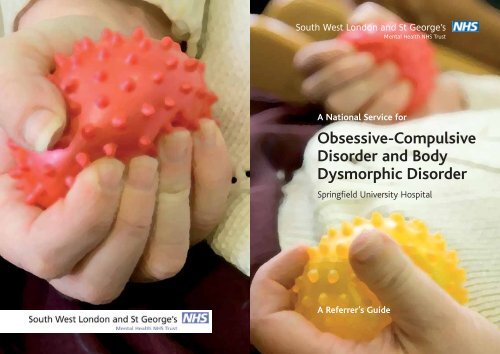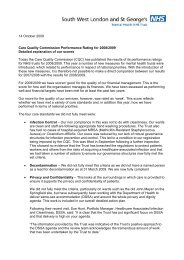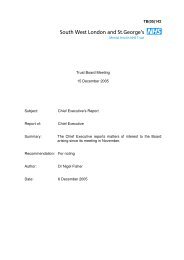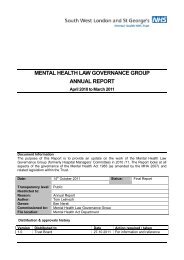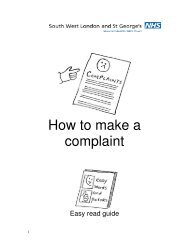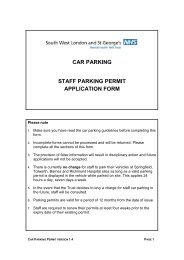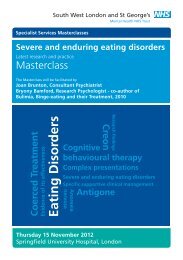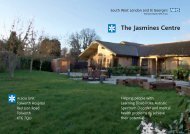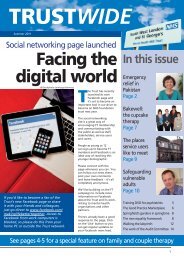OCD-BDD National Referrer's Guide - South West London and St ...
OCD-BDD National Referrer's Guide - South West London and St ...
OCD-BDD National Referrer's Guide - South West London and St ...
Create successful ePaper yourself
Turn your PDF publications into a flip-book with our unique Google optimized e-Paper software.
<strong>South</strong> <strong>West</strong> <strong>London</strong> <strong>and</strong> <strong>St</strong> George’s<br />
Mental Health NHS Trust<br />
A <strong>National</strong> Service for<br />
Obsessive-Compulsive<br />
Disorder <strong>and</strong> Body<br />
Dysmorphic Disorder<br />
Springfield University Hospital<br />
A Referrer’s <strong>Guide</strong>
1<br />
Who we are<br />
We are a multidisciplinary national service<br />
funded by the <strong>National</strong> Commissioning<br />
Group (NCG) to provide treatment for<br />
the most severely ill patients (level 6)<br />
with Obsessive Compulsive Disorder<br />
(<strong>OCD</strong>) <strong>and</strong> Body Dysmorphic Disorder<br />
(<strong>BDD</strong>) in the form of intensive homebased<br />
therapy, outpatient, <strong>and</strong> inpatient<br />
treatment.<br />
The inpatient unit comprises ten beds, <strong>and</strong> we<br />
provide 24-hour care where appropriate. Ours is<br />
the only 24 hour staffed dedicated inpatient unit<br />
for <strong>OCD</strong> <strong>and</strong> <strong>BDD</strong> within the NHS.<br />
The team comprises psychiatrists from training<br />
grades to consultant, nurses, specialist CBT<br />
therapists, health care assistants, physiotherapists,<br />
<strong>and</strong> occupational therapist.<br />
We are committed to ensuring best practice <strong>and</strong><br />
state-of-the-art treatments are delivered <strong>and</strong><br />
developed throughout the UK. To this end we are<br />
involved in continual research <strong>and</strong> audit into all<br />
aspects of <strong>OCD</strong>, <strong>BDD</strong> <strong>and</strong> anxiety disorders <strong>and</strong><br />
their treatment.
2<br />
3<br />
Who the service is for<br />
As a <strong>National</strong> Service we are happy to offer advice<br />
<strong>and</strong> guidance on the treatment of <strong>OCD</strong> <strong>and</strong> <strong>BDD</strong><br />
to secondary care mental health teams throughout<br />
the UK. In such cases we are able to advise whether<br />
or not the patient is suitable for treatment by the<br />
<strong>National</strong> Service, <strong>and</strong> if not suitable what should<br />
happen next <strong>and</strong> what treatments should be offered.<br />
If potential referrers are unsure of the suitability of<br />
a patient, we are always delighted to discuss the<br />
case with them <strong>and</strong> offer advice. As we are centrally<br />
funded, this also is at no cost to the referrer.<br />
To be accepted for treatment in the <strong>National</strong> Service,<br />
patients must be over 18 years <strong>and</strong> be at Level 6<br />
severity according to NICE guidelines as follows:<br />
Home-based <strong>and</strong> Community Treatment<br />
We are able to offer our expertise to treat patients<br />
who do not require inpatient admission in their<br />
own homes <strong>and</strong> in the community. This may take<br />
the form of intensive home-based therapy for those<br />
patients who are able to comply with a more rapid<br />
treatment path. Some patients are so disabled they<br />
are unable to come into hospital despite being<br />
unable to care for themselves. In such cases we can<br />
offer home-based therapy to start the treatment<br />
process with the aim of them coming into hospital.<br />
In addition, we may offer outpatient or telephone<br />
treatment sessions following more intensive<br />
interventions.<br />
Yale-Brown Obsessive Compulsive<br />
scale (or YBOCS-<strong>BDD</strong>)<br />
Previous treatment with SRI (serotonin<br />
reuptake inhibitor) drugs at BNF<br />
recommended doses for minimum<br />
three months*<br />
Augmentation of above, eg neuroleptic<br />
drugs, or higher than BNF recommended<br />
doses of SRI drugs, or a combination of<br />
SRI <strong>and</strong> tricyclic drugs<br />
Previous treatment with CBT which<br />
included graded exposure <strong>and</strong> selfimposed<br />
ritual prevention<br />
30 to 40<br />
Two trials<br />
One trial<br />
Two trials of which one<br />
should have taken place<br />
where symptoms are<br />
maximal (eg at home)<br />
*It is recognised that<br />
some patients are<br />
unable to comply with<br />
the medication criteria<br />
due to their <strong>OCD</strong><br />
symptoms. In such<br />
cases this is examined<br />
on an individual basis.
4 5<br />
Referrals<br />
Inpatient Treatment<br />
Some patients are so unwell they are unable<br />
to care for themselves or safely complete any<br />
community therapy. For these people inpatient<br />
treatment is necessary. To be eligible for inpatient<br />
treatment <strong>and</strong> 24-hour nursing care, we would<br />
look for clear reasons why less intensive approaches<br />
are not applicable. For example:<br />
Referrals are welcomed from secondary mental<br />
health services across the UK.<br />
The referring team should complete the unit’s<br />
referral form which can be supplied on request.<br />
Mental Health teams may also seek telephone<br />
consultation.<br />
■ Danger to self, eg failure to drink sufficient<br />
fluid to support health due to <strong>OCD</strong><br />
■ Danger to others, eg impulsive acts leading<br />
to placing family at risk<br />
■ Extreme self-neglect, eg incontinence<br />
■ Complicating dual diagnosis, eg co-existing<br />
schizophrenia or eating disorder<br />
■ Severely disordered sleep pattern resulting<br />
in being asleep during the day <strong>and</strong> unable<br />
to awaken in time for therapy<br />
■ Diagnostic doubt requiring initial 24 hour<br />
observation.<br />
We cannot admit patients detained under the<br />
Mental Health Act.<br />
Funding<br />
As a centrally funded service, referrers <strong>and</strong> their<br />
respective NHS commissioners do not need to<br />
identify additional payment for the assessment or<br />
treatment of patients from Engl<strong>and</strong> <strong>and</strong> Scotl<strong>and</strong>.<br />
Patients from Wales <strong>and</strong> Northern Irel<strong>and</strong> will<br />
require a named patient service agreement.
6<br />
7<br />
What we offer<br />
Once a patient has been accepted for assessment<br />
by the <strong>National</strong> Service, we offer an appointment<br />
at our clinic. This is a lengthy process <strong>and</strong> patients<br />
will be in the unit for 2-3 hours. A multi-disciplinary<br />
assessment takes place <strong>and</strong> full discussion is held<br />
with the patient <strong>and</strong> relatives about future<br />
treatment. At the end of the assessment a full<br />
assessment report is sent to the referring team,<br />
GP <strong>and</strong> to the patient. This report outlines the<br />
history <strong>and</strong> also our recommendations for treatment.<br />
The ideal situation is always that the patient, any<br />
carers <strong>and</strong> sometimes their key worker travels to<br />
the Unit <strong>and</strong> meets the Team to fully discuss<br />
treatment. This also gives patients the opportunity<br />
of visiting the ward if inpatient treatment is<br />
recommended. We do, however, realise that some<br />
patients are too ill to travel in this way. In such<br />
cases we may arrange to conduct a telephone<br />
assessment with the patient, to visit the patient<br />
together with the local team or, occasionally, to<br />
admit the patient directly for a two week assessment.<br />
When the patient is seen for assessment, they are<br />
told what will happen next. In the case of homebased<br />
therapy, they will either be given a date to<br />
start therapy <strong>and</strong> the name of the therapist at this<br />
time or will be told when they will be given this.<br />
In the case of inpatient treatment, there is normally<br />
a waiting list <strong>and</strong> they will be advised how long this<br />
may be <strong>and</strong> when they are likely to hear from us.<br />
In the case of inpatient treatment, on admission,<br />
each patient is allocated a therapist <strong>and</strong> a named<br />
nurse. The structured start-up programme comprises<br />
three groups per day with a full programme of<br />
Occupational Therapy (both group <strong>and</strong> individual);<br />
individual CBT sessions as well as medication <strong>and</strong><br />
physical health review. Other groups which form<br />
the programme include art, social skills, cooking<br />
<strong>and</strong> gardening.<br />
Weekend home leave is a normal part of the<br />
programme once the patient is able to cope in<br />
this way. Patients are expected to try to implement<br />
changes learned on the ward in their own home.<br />
Such patients may need to contact the unit to<br />
discuss problems or just to say that they are<br />
managing well.<br />
The involvement of family members is encouraged,<br />
both during an admission <strong>and</strong> after discharge home.<br />
Regular formal reviews take place at 6, 12, <strong>and</strong> 24<br />
weeks. The referring mental health team is expected<br />
either to attend or to teleconference as part of<br />
the CPA process.
8<br />
9<br />
Clinical outcomes<br />
40<br />
35<br />
Since 2008, we have obtained clinical outcome<br />
data on 117 patients (58 women <strong>and</strong> 59 men)<br />
suffering from <strong>OCD</strong> <strong>and</strong> <strong>BDD</strong>.<br />
30<br />
25<br />
Average age of 37 years<br />
(range 18 to 80 years, SD = 14)<br />
Mean duration of <strong>OCD</strong> of 19 years<br />
(range 4 to 50 years, SD = 11)<br />
Mean stay in hospital of 18.7 weeks<br />
(range 0 to 225 days, SD = 59)<br />
20<br />
15<br />
10<br />
5<br />
Measure Before After <strong>St</strong>atistical<br />
Treatment Treatment Significance<br />
P=value<br />
0<br />
Before<br />
treatment<br />
After<br />
treatment<br />
YBOCS(sd) 34(4) 23(8)
10 11<br />
Case Vignette<br />
Mr A is a 20 year old from North Lincolnshire with<br />
the diagnosis of early-onset <strong>OCD</strong> with hearing<br />
impairment, dyscalculia, dyslexia <strong>and</strong> developmental<br />
dyspraxia in the context of a pervasive<br />
developmental disorder.<br />
He presented with a strong <strong>and</strong> over-generalised<br />
fear of contamination with gelatine, which has led<br />
to a complete avoidance of the use of his own<br />
h<strong>and</strong>s. He was admitted to Heather Ward in<br />
October 2009 after attempts of serious self-harm,<br />
malnutrition <strong>and</strong> multiple treatment failures with<br />
the local services.<br />
During the course of inpatient treatment, the<br />
severity of his <strong>OCD</strong> reduced by 75% (as measured<br />
on YBOCS). This has further reduced to 95%<br />
during the one-year follow-up period, with a<br />
complete remission in most of the symptoms<br />
of his <strong>OCD</strong>.
12<br />
Contact details<br />
<strong>National</strong> Service for <strong>OCD</strong> <strong>and</strong> <strong>BDD</strong><br />
Building 15 (Teak Tower)<br />
Springfield University Hospital<br />
61 Glenburnie Road<br />
<strong>London</strong> SW17 7DJ<br />
Tel: 020 3513 6961<br />
Fax: 020 3513 6965<br />
Switchboard tel: 020 3513 5000<br />
Specialist Services Directorate tel:<br />
020 3513 6305<br />
Email: business.development@swlstg-tr.nhs.uk<br />
How to find us<br />
The nearest tube station to Springfield Hospital is<br />
Tooting Bec (Northern Line), a 12-15 minute walk.<br />
Bus G1 serves Springfield Hospital itself. On nearby<br />
Trinity Road there are buses 219 <strong>and</strong> 319. On<br />
Upper Tooting Road there are buses 57, 155, 219<br />
<strong>and</strong> 355. On Tooting Bec Road there are buses 249<br />
<strong>and</strong> 319.<br />
Design from The Drawing Room www.drawingroom.uk.com Photography by Paul Lapsley<br />
Revise Feb 2012


